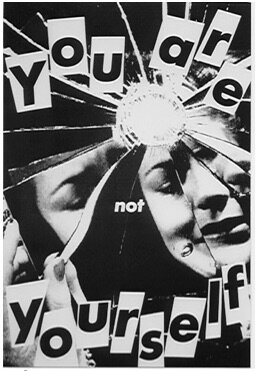"Postmodernism is what you have when the modernization process is complete and nature is gone for good." Frederic Jameson, Postmodernism Or, The Cultural Logic of Late Capitalism, p. IX. "We might say that postmodernism is what you have when the modern theory of social constructivism is taken to its extreme and all subjectivity is recognized as artificial." (Hardt and Negri, Empire, p. 196) "The point is that we are within the culture of postmodernism to the point where its facile repudiation is as impossible as any equally facile celebration..." (Jameson, p. 62)
Any account of postmodernism must address the tangled relationship between its writing and its object. As Frederic Jameson admits, "I would not want to have to decide whether the following chapters (of his book Postmodernism) are inquiries into the nature of such "postmodernism theory" or mere examples of it." Some disaffected critics claim that "A key to understanding the postmodern temper is that, for it, the distinction between truth and illusion has lost its purchase. " (Simpson, Technology, Time and the Conversations of Modernity, p.87)
Frederic Jameson is not quite so sure. He goes on to ask whether we can identify some "moment of truth" within the more evident "moments of falsehood" of postmodern culture. For Jameson, postmodern culture has lost its "semiautonomy," or critical distance, and aesthetic production today has become integrated into commodity production. But for him, the "moment of truth" of postmodernism is the new global space -- the "postmodern hyperspace which has finally succeeded in transcending the capacities of the individual human body to locate itself, to organize its immediate surroundings perceptually, and cognitively to map its position in a mappable external world." (p.44) Is globalization just another name for postmodernism?
One critical objective generally attributed to philosophical postmodernism is its intent to deconstruct the idea of totality. Consequently, the postmodern orientation activates what might be called mixed practices, de-totalized practices, or impure thinking practices. (Alain Badiou, Infinite Thought, p.44) Katherine Hayles describes postmodernist theories as part of the matrix that engenders them: complex feedback loops that connect new theories, new technologies, and new social formations. She recognizes some of postmodernism's contradictions. In its theoretical guises, postmodernism champions the disruption of globalized forms and rationalized structures. In its technological guises, it continues to erect networks of increasing scope and power. Yet despite their apparent opposition, these two aspects of cultural postmodernism engage each other in self-sustaining feedback loops. Cultural critics who believe that the new theoretical developments of chaos theory, complexity theory, and systems theory offer significant models for social critique stress the "recursive" workings of these transformations of social knowledge and the unpredictablity of their consequences.
The relationship between postmodern theories and the new configurations of power in the world market are fully intertwined. The relation to "late capitalism" to commodity / media / entertainment capital:"Aesthetic production today has become integrated into commodity production." (Jameson. p.4) Postmodern culture is often characterized as an era of "hyper-representation," in which categories such as "the thing itself," the "authentic," and "the real," which were formerly considered the objects of representation now become themselves representations, endlessly reduplicated and distributed. (W.J.T. Mitchell)
Are postmodern theories critiques of the world market of the new "Empire," or do they simply mark the passage to a new order? Michael Hardt and Antonio Negri follow Frederic Jameson by considering postmodernism as a new "cultural dominant" that follows the logic by which global capital operates. "One could even say that capitalist marketing strategies have long been postmodernist, avant la lettre, especially in its recognition of difference. Postmodern marketing recognizes the difference of each commodity and each segment of the population, fashioning its strategies accordingly. Every difference is an opportunity.
Barbara Kruger
Is there a postmodern period? (1973 - ?) For Frederic Jameson, postmodernism is "a periodizing hypothesis" at "a moment in which the very conception of historical periodization has come to seem most problematical indeed." (p.3) "Analyzing postmodernism amounts to writing the history of no history. In an important sense, to write the history of postmodernism is to indulge in an anachronism." (Hayles, Chaos Bound, p.281)"It is safest to grasp the concept of the postmodern as an attempt to think the present historically in an age that has forgotten how to think historically in the first place." (Jameson, Postmodernism, introduction) Jameson limits the brief "American Century" to 1945-1973. According to him, the crises of 1973 (the oil crisis, the end of the international gold standard, for all intents and purposes the end of the great wave of "wars of national liberation" and the beginning of the end of traditional communism) disclosed the existence, already in place, of a strange new landscape....
In Postmodernism, modernism assumes the role previously assigned to tradition, and postmodernism is associated with the present (previously called modernity). Because of the conflation of modernity and tradition, postmodernity can claim either to reject tradition or to renew it, without contradiction. Hardt and Negri question whether postmodern theorists are so intent on combating the remnants of a past form of domination that they fail to recognize the new form that is looming over them in the present. "What if the dominating powers that are the intended object of critique have mutated in such a way as to depotentialize any postmodern challenge?" "In this case, ... the postmodernist and postcolonialist strategies that appear to be liberatory would not challenge but in fact coincide with and even unwittingly reinforce the new stategies of rule!" (Empire, p. 138)
Brian Goodwin describes postmodern science where one can excercize one's judgement in choosing a set of scientific ideas as opposed to another. For him, to argue that a new paradigm will out-compete a previous one, is to engage in "the authoritarian mode of science that characterized modernity." (How The Leopard Changed Its Spots, p. 34)
From the conceptualized flatness of high modernism to the literal superficiality of postmodernism.
(cf. surface / depth )
text and simulacrum
